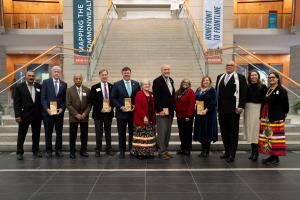
Tribal Leaders Honor Their Champions in the General Assembly
“Securing passage of HB 1157—making Virginia the first southeastern state and only the 15th nationwide to enact a tribal consultation law—would not have been possible without the leadership of our Tribal Champion awardees,” said Stephen Adkins, Chief of the Chickahominy Indian Tribe.
The law requires state agencies to consult with tribes before granting certain permits, such as large groundwater withdrawals, collection of materials from caves, and removal of underwater historic property. It also creates the position of Tribal Ombudsman, who will ensure the development of meaningful and clear consultation policies between state agencies and Tribal Nations.
“We commend our Tribal Champions for their work to improve the relationship between the Commonwealth and federally recognized tribes” said Anne Richardson, Chief of the Rappahannock Tribe.
The awards were presented by Chief Frank Adams of the Upper Mattaponi Tribe, Chief Diane Shields of the Monacan Indian Nation, Chief Keith Anderson of the Nansemond Indian Nation, Chief Stephen Adkins of the Chickahominy Indian Tribe, and Chief Anne of the Rappahannock Tribe.
“This event showcases our history and our most recent achievements,” said Keith Anderson, Chief of the Nansemond Indian Nation. “We are proud to share our accomplishments with state officials. In the seven years since we secured federal recognition, we have made numerous investments that are transforming our communities for the better.”
At the reception, the Tribes featured display tables highlighting aspects of their cultures and communities. Guests received glossy copies of the “Tribal Accomplishments Report” highlighting how the Tribes have leveraged their federally recognized status to tackle major initiatives like opening health clinics, starting a community garden and food bank, reacquiring their ancestral homelands, and safeguarding the environment through a variety of land and water restoration projects.
“Virginia’s federally recognized Tribal Nations hold a distinct and enduring sovereignty recognized by both the Commonwealth and the federal government, reflecting centuries of self-governance and tradition,” said Jessie Barrington, an attorney at Cultural Heritage Partners, the law firm organizing the event. “This reception highlights the central role tribes play in protecting our communities’ health and welfare, driving economic development, and preserving the cultural heritage we all share—continuing the promises embodied in the Treaty of Middle Plantation. By honoring tribal sovereignty and maintaining a true government-to-government partnership, we ensure that these voices remain integral to shaping a more inclusive, resilient future for everyone in Virginia.”
Tribal officials also asked the legislators to support their top legislative priority for the 2025 General Assembly, HB 2134/SB 949, a bill to update the Virginia Code to reflect the presence and inherent sovereignty of federally recognized Tribal Nations headquartered in the Commonwealth. The bills are patroned by Del. Paul Krizek and Sen. Ryan McDougle, both of whom received Tribal Champion awards.
About the Tribal Nations of Virginia:
Native Americans have long played a central role in developing the nation’s political landscape, agriculture, cuisine, geographic boundaries, military defense, and culture. Across the Commonwealth, rivers, highways, and towns called by Indian names bear witness to the presence of Virginia’s tribes and their stewardship. The Chickahominy Indian Tribe, the Chickahominy Indian Tribe – Eastern Division, the Monacan Indian Nation, the Nansemond Indian Nation, the Rappahannock Indian Tribe, and the Upper Mattaponi Indian Tribe maintain distinct cultural identities and share their history and culture through cultural events, powwows, and church membership. Each Tribal Nation is also a sovereign government, acting on a variety of governance, business development, equity, and cultural and historic preservation issues. Elements from their original languages persist, and the Tribes maintain songs and dances. While the Tribal Nations maintain close relationships, they are individual communities that may have different perspectives on contemporary and historical issues.
Christine Grubbs
Cultural Heritage Partners, PLLC
+1 703-408-2002
email us here
Distribution channels: Culture, Society & Lifestyle, Energy Industry, Environment, Politics, U.S. Politics
Legal Disclaimer:
EIN Presswire provides this news content "as is" without warranty of any kind. We do not accept any responsibility or liability for the accuracy, content, images, videos, licenses, completeness, legality, or reliability of the information contained in this article. If you have any complaints or copyright issues related to this article, kindly contact the author above.
Submit your press release
